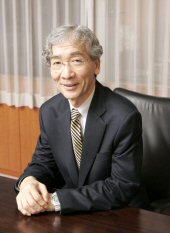ダウンロード
場所
ドイツ-日本研究所 Deutsches Institut für Japanstudien
〒102-0094 東京都千代田区紀尾井町7-1
上智紀尾井坂ビル 2F
Tel: 03- 3222-5077
アクセス
登録情報
参加ご希望の方はFAX: 03 – 3222 5420又はe-mail:dinkel@dijtokyo.org にてお申し込みください。(参加無料)
Japan's Innovation Agendas
2007年2月15日 / 6.30 P.M.
Taizo Yakushiji, Ph.D., Council for Science and Technology Policy, Cabinet Office
 Given that Japan faces aging and labor shortage in the near future, Japan’s future agenda is simply “innovation.” Innovation increases the wealth of a nation through economic realization. This is conventional wisdom. However, unconventional is the fact that it often triggers the decline of a nation. The reasons are four-fold:
Given that Japan faces aging and labor shortage in the near future, Japan’s future agenda is simply “innovation.” Innovation increases the wealth of a nation through economic realization. This is conventional wisdom. However, unconventional is the fact that it often triggers the decline of a nation. The reasons are four-fold:
First, the emergence of contenders, like China. Latent competitors eventually come up when they are successful in technological “emulation”. “Emulation” in this sense implies “copying” plus substantial “improvement.”
Second, “techno-parochialism”. This happens when a nation at the forefront of the innovation race, like Japan today, or the U.S. in the mid 1980s, starts to look only inwards. Parochial pride leads to arrogance, making people forget the very secret of pre-eminence, i.e., the “emulous (innovative) power”.
Third, vulnerability of international technological cooperation. Conventional wisdom has it that technology lends itself to international cooperation. This is a naïve view. In actual fact, innovation is potentially both, cooperative and competitive. The recent alliance of Japanese semiconductor manufacturers against South Korean SAMSUNG is a case in point.
Fourth, economic rationality prevails. Gains in national wealth invite blind belief in economic efficiency. But efficiency taken too far can be an impediment to innovation which is often costly in terms of time and money.
Taizo Yakushiji took his Ph.D. in Political Science at Massachusetts Institute of Technology. Besides his Professorship he is member of the Council for Science and Technology Policy, Cabinet Office and serves as Executive Research Director at the Institute for International Policy Studies.